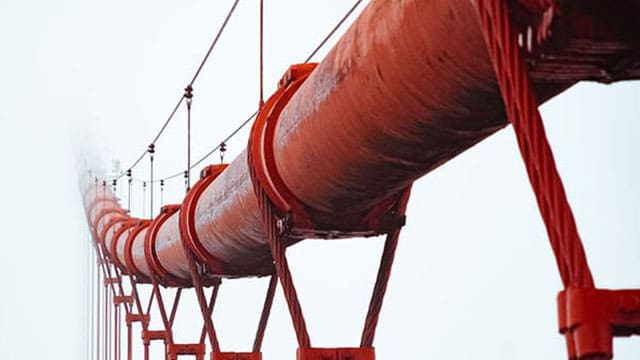How the Trudeau government fueled Canada’s oil industry boom

For interview requests, click here
In the final analysis, Justin Trudeau’s government has not been as detrimental to the fossil fuel industry as it is often portrayed.
Industry leaders greeted the news of Trudeau’s departure with enthusiasm. Bob Geddes, president of Ensign Energy Services, told the Calgary Herald’s Chris Varcoe, “There’s no question from the beginning that his (Trudeau’s) purpose was to kill the oil and gas business. This is a good day for Canada.” Heather Exner-Pirot, special advisor on energy to the Business Council of Canada, told The Canadian Press, “The Liberal government has made Canada’s oil and gas sector uncompetitive.” Quoted by Max Fawcett in the National Observer, she added, “So, there is some optimism now that Canada will finally be a place that’s open for business.”
Interestingly, both Trudeau and U.S. President Joe Biden were viewed as unfriendly to the oil and gas industry. Yet, under their respective administrations, the sector thrived. Despite being seen as more climate-friendly compared to Donald Trump’s first term, U.S. crude oil production reached record highs during Biden’s presidency, surpassing 13 million barrels per day (bpd) for the first time.
 Will the industry one day look back and reassess the prime minister they so often loved to hate? |
| Recommended |
| Green energy struggles as fossil fuels surge back to dominance
|
| Biofuels and biogas are costly distractions from real energy solutions
|
| Green energy hype isn’t backed by the data
|
Canada under Trudeau followed a similar pattern. Despite implementing a carbon tax and pursuing ambitious zero-emission targets, the oil and gas sector increased its output, and critics’ claims that Trudeau’s government “closed” Canada to the oil and gas industry, the sector increased production by more than one million barrels per day during his tenure. Major producers posted record profits in 2022, nearly repeating those achievements in 2023. Producers have benefited from a weaker Canadian dollar, narrower price discounts on Western Canada Select (WCS), and increased export capacity
Canadian Natural Resources Ltd. (CNRL) recently announced plans to raise production this year by 12 per cent, to between 1.51 million and 1.56 million barrels of oil equivalent per day. Much of this increase is attributed to acquisitions, including last October’s US$6.5-billion purchase of Chevron Corp.’s oilsands assets.
Other producers have also posted significant gains. Suncor Energy reported record production in 2024, achieving an annual output of 827,000 bpd – a 10.9 per cent increase from 2023 and 17,000 bpd above projections. The company set a quarterly production record of 874,000 bpd in the fourth quarter of 2024, a year-over-year increase of 66,000 bpd. For 2025, Suncor plans to boost production by up to five per cent. Imperial Oil Ltd. forecasts output growth of approximately three per cent, while Whitecap Resources Inc. anticipates organic production growth per share of five to 10 per cent.
Notably, the Trans Mountain pipeline expansion (TMX), completed under Trudeau’s government, provided a much-needed boost to the industry. The project expanded export capacity, supported higher prices for Canadian heavy oil, and opened access to fast-growing Asian markets. While politically costly for the government, TMX has been a significant factor in enabling growth and strengthening market conditions for Canadian oil producers.
Optimism also stems from new opportunities. The commercial start-up of LNG Canada and other export capacity proposals, such as those from Enbridge Inc., are contributing to a positive outlook. Although tariff threats from U.S. President-elect Donald Trump have raised concerns, Canadian producers remain confident in the resilience of global demand and are planning to increase production through 2025.
Questions remain about the future of the Pathways Alliance project, a collaboration between Canada’s six largest oilsands producers and the federal and Alberta governments. The Trudeau government set a target to reduce greenhouse gas emissions from oilsands operations by 22 million tonnes annually by 2030 and achieve net-zero emissions by 2050. The Pathways Alliance proposed a carbon capture and storage network to transport CO2 from about 20 facilities to a hub in Alberta’s Cold Lake region for underground storage, with the network also available to other industries seeking to manage emissions.
Asked if the project was at risk, CNRL president Scott Stauth expressed optimism. “I think we’re a little bit more positive than you’re suggesting,” he said. “We’re progressing these carbon capture projects from an engineering perspective for 2025.” In the long term, such initiatives could prove crucial for the industry’s survival in a decarbonizing global economy.
Trudeau’s most significant impact on the oil and gas industry may be yet to come. The sector’s long-term viability in a net-zero world depends on its ability to meet emissions targets while maintaining competitiveness. As the National Observer’s Max Fawcett observed, “Oil and gas CEOs think Justin Trudeau has been trying to kill their industry. The facts suggest he’s been doing something else – trying to save them from it and the future they refuse to prepare for.”
One day, the industry might look back and reassess the prime minister they so often loved to hate.
Toronto-based Rashid Husain Syed is a highly regarded analyst specializing in energy and politics, particularly in the Middle East. In addition to his contributions to local and international newspapers, Rashid frequently lends his expertise as a speaker at global conferences. Organizations such as the Department of Energy in Washington and the International Energy Agency in Paris have sought his insights on global energy matters.
Explore more on Energy sector, Trudeau government
Troy Media is committed to empowering Canadian community news outlets by providing independent, insightful analysis and commentary. Our mission is to support local media in building an informed and engaged public by delivering reliable content that strengthens community connections, enriches national conversations, and helps Canadians learn from and understand each other better.
